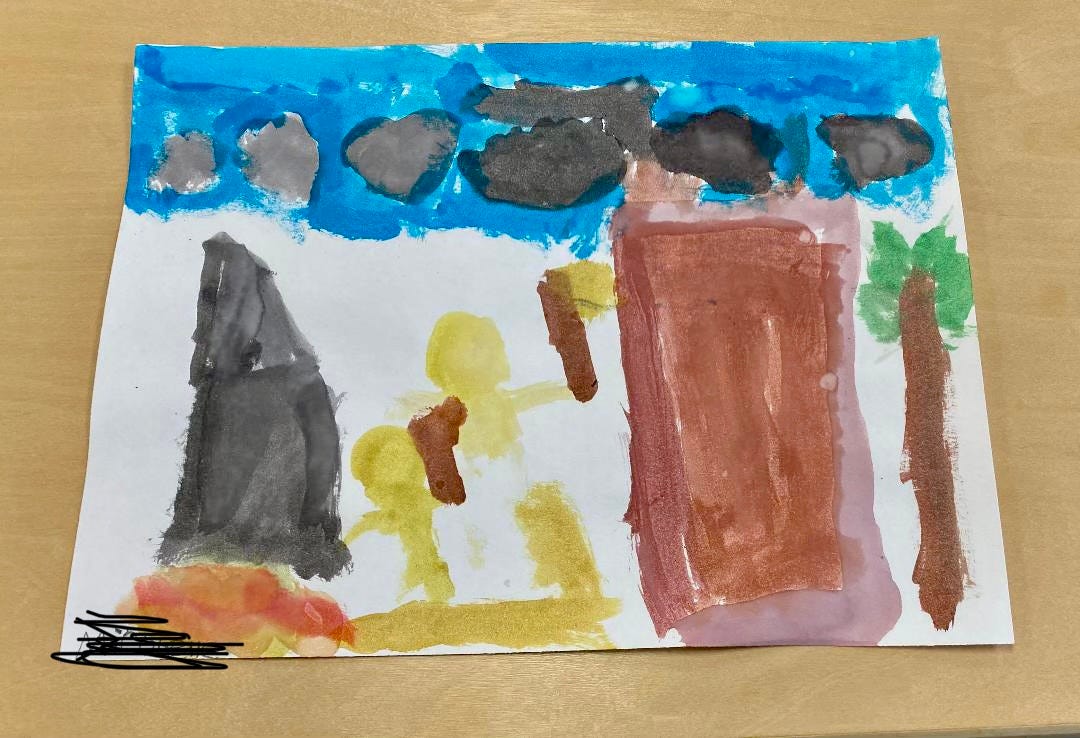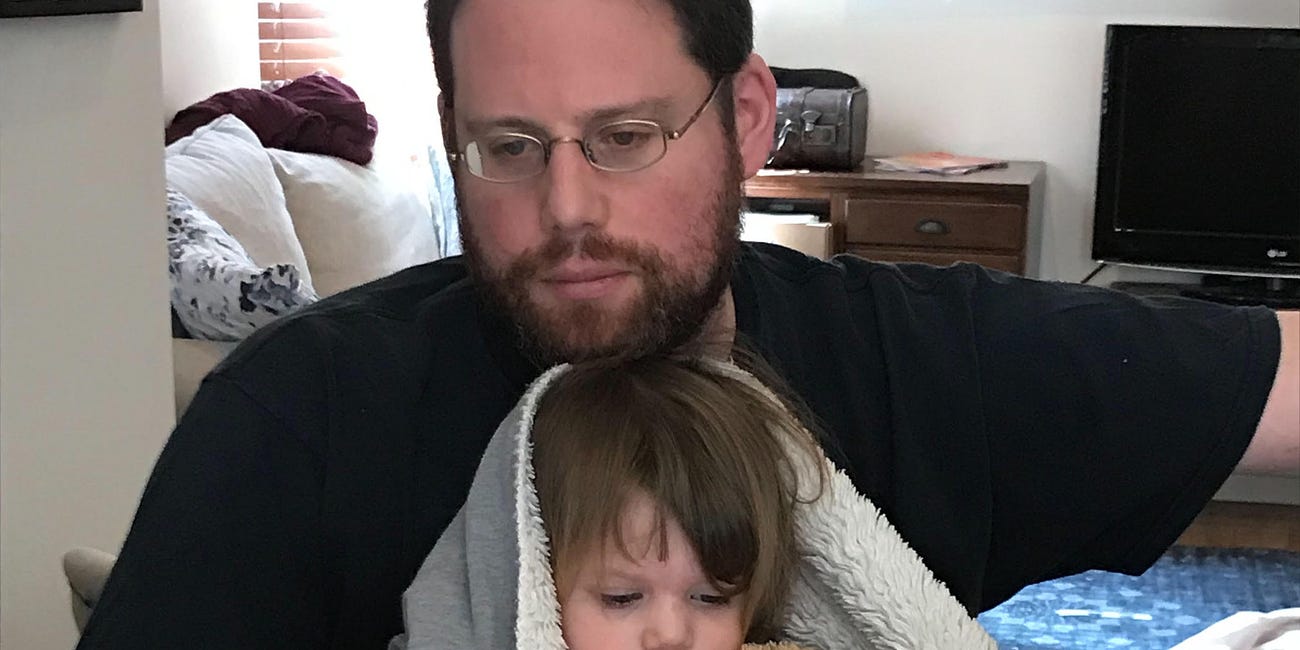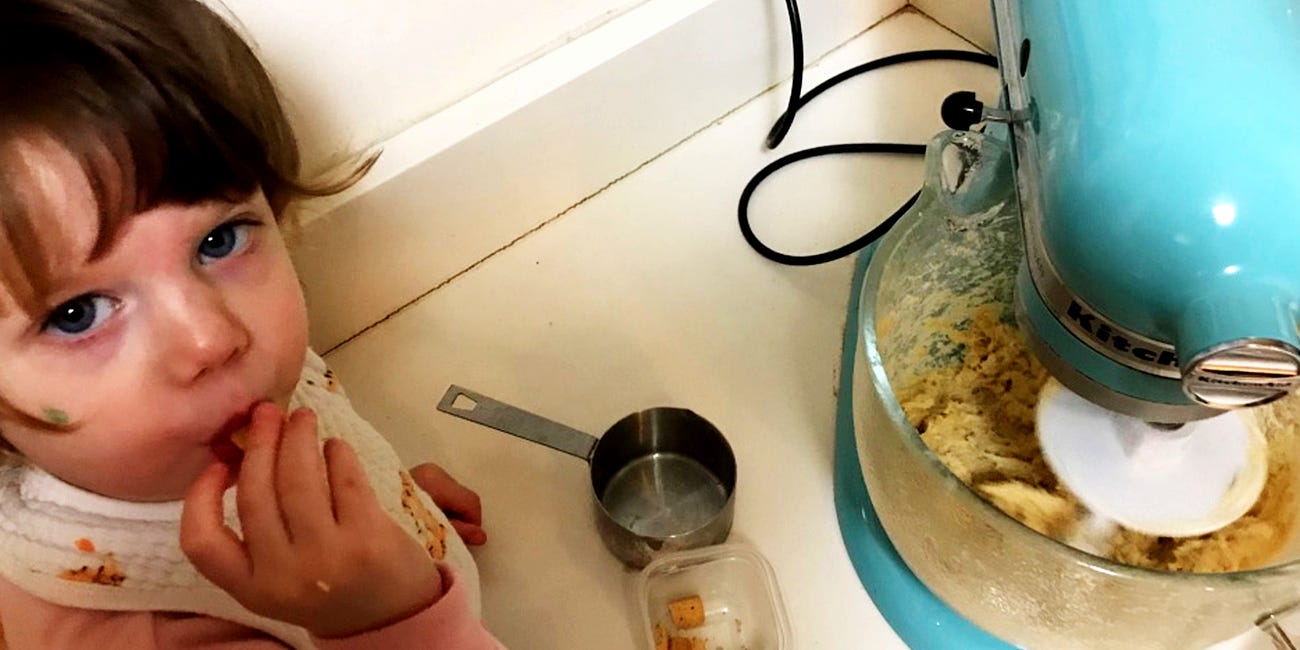Are you willing to listen to my friend Elie?
What happened in Israel on Oct. 7 was much worse than 9/11.
Welcome to the always free, reader-supported mid-week edition of The Experiment. If you’d like to support my work, buy my Alamo book, buy some Experiment merch, drop some coins in the PayPal fountain, or become a paid subscriber. But even if you don’t, this bugga free.
When the terrorists attacked, Elie Jacobs had already silenced and put away his phone and walked with his wife and two young daughters to temple. Soon, though, security guards offered updates, and stragglers to shul had more information. So Elie stayed at the kiddush, a social hour after services, and had a few drinks. It seemed like the right thing to do.
“Basically, there was nothing any of us could do other than pray and be together,” he said. “In the moment I’d rather have been with my community than walking the 30 minutes back to our apartment and spend hours freaking out.”
Elie called that moment when he was sharing fellowship, some of whom were still Israeli Reservists, “some kind of f*cked up Schrodinger’s Jew experiment.” Elie figured his 75-year-old parents were safe in Jerusalem. It was far enough from Gaza, and their apartment building had a bomb shelter. He figured that he knew people who had relatives who had been killed or kidnapped — in fact, an 84-year-old woman they kidnapped is his friend’s aunt. He knew that he probably had friends who would join the fight. There are so few Jews in the world, that Elie’s connected in some way to just about anyone in Israel. But he didn’t know who was or would be directly affected yet. Everything in his temple in New Jersey was safe and normal, but Israel’s existence was not. Elie was fine, and Elie was not fine.
“some kind of f*cked up Schrodinger’s Jew experiment”
Our desire to understand combined with Americans’ appalling lack of knowledge in foreign affairs forces us to categorize Hamas’s terrorist attack as Israel’s 9/11, which Elie calls an “inexact comparison.” It’s actually much worse.
The Camp David Accords with Egypt meant that one of Israel’s borders was safe. Then the Oslo Accords in 1993 and 1995 sandwiched the Israel-Jordan Treaty in 1995, and as Iran became more radicalized, more quiet cooperation started happening with other nations in the Gulf. With all that, “The idea that Israel’s gonna get wiped off the face of the Earth sort of evaporated because in ‘56, ‘67 and ‘72, that was a real possibility. Even ‘82 was a possibility,” said Elie. “I don't know anyone who thought 9/11 was gonna be the end of America. There was very much the sense that October 7th could have been the end of Israel.”
When he got home, Elie broke the Sabbath and turned on his phone to text his dad, which brought a gentle rebuke in return. “Why are u checking phone?” texted his dad. “I did not expect to hear from u until tomorrow.”
“Special circumstances,” replied Elie. “Putting it down in a second. Unless you want to talk to the kids.”
“The idea that Israel’s gonna get wiped off the face of the Earth sort of evaporated.”
His dad demurred. It was still Yom Tov. He passed along love from his mom and asked Elie to kiss his girls, but that wasn’t enough. The younger daughter didn’t get what was happening, but the older one in kindergarten knew. Attacking Israel meant her grandparents were in danger.
“She kind of sees and hears just enough to be asking a lot of very difficult questions that I can’t answer,” said Elie, who asked his dad to Facetime her.
The Monday after the attack, Elie asked her how school went. She told him that she painted a water color of the “bad men trying to hurt Bubbie and Zeide.”
If that sounds like something they shouldn’t be talking about in kindergarten, then you don’t understand what is happening in Jewish schools these days. The war is intimately integrated with their daily lives. Four of the families at that school are mourning relatives killed by Hamas, which the Times of Israel called “hardly unusual among Jewish schools in North America.” The kids’ school has taken on a bunch of new kids because the mothers flew to New Jersey to be with family because their husbands were called up. Three of the fathers of students at her school have been called back to active duty.
“It’s one degree [of separation] with us Jews,” said Elie. “There aren’t that many of us. Thanks, Hitler!”
“It’s one degree with us Jews There aren’t that many of us. Thanks, Hitler!”
So many Jewish Americans are getting called up in the largest mobilization in Israel’s history that awkward situations can arise, like the time the class WhatsApp parent group got this text from one of mothers from their oldest daughter’s class.
“Hey, y’all,” began the text. “For the next couple months, it's just me and the kiddos. If anyone would like a play date after school or on Sunday, or even would come to us on Saturday. … Also, if anyone has recommendations for fun, safe, AKA no wide open space is where my paranoid self worries about losing a kid. I’d much appreciate it. On another note, sending love and warm thoughts to all like ourselves with a lot of family and friends. We were worried deeply praying for safety for everybody.”
“Which given the context of everything going on, that can only mean one thing,” said Elie. Obviously her husband had been called up, so his wife and seven or eight others arranged to go over to her house last Monday for drinks and comfort.
“And turns out, no, he’s not in Israel,” said Elie. “He’s in California selling insurance.
Jewish schools and synagogues are taking up collections to send to Israel, “everything from toothpaste to body armor,” said Elie. His family filled a bag to take to school. “She was insistent she could carry the bag [in her words] ‘for the Israelis.’ She took a lot of pride in being able to do it. I also heard her singing ‘HaTikva’ to herself as she was falling asleep the other night. Something flew into my eye…”
HaTikva, the Israeli national anthem, translates as “The Hope.”
“Dada, why is Israel at war?”
“Dada, why is Israel at war?” was another of his older daughter’s questions. It’s not a matter of shielding this girl from the answer. But how do you tell a girl that people have hated Jews forever?
Last year, antisemitic attacks hit their highest level since the ADL started keeping records of in 1979 and were up more than a third over 2021. To Elie, this is not a surprise. “Antisemitism is the world’s oldest hate, right?” he said. “It’s part of life for us. You grow up learning about it, you grow up experiencing it, you grow up knowing about it.”
Several of his friends are third generation, meaning that their grandparents were survivors of the Holocaust. Elie remembers seeing a friend’s grandfather’s tattoo for the first time. He knew what it meant. “I was probably around eight or nine years old when like all the pieces kind of clicked together,” he said.
“You grow up experiencing it, you grow up knowing about it.”
“Whether it’s what happened [three] Saturdays ago or what happened over the span of however many years in the bus bombings, during the Lebanon War in'82, the Yom Kippur War in '72 and '67 and '56 and '48 to the Holocaust, straight back to the pogroms and the Khmelnytsky Massacre, let alone the gulags. It’s just all there. And it’s constantly there. Never goes away. And you’re aware of it.
“It’s part of the prayers on a regular basis,” he said. “When you sing ‘Next year in Jerusalem’, it’s about a redemption. It’s not just, we’re gonna be in Jerusalem for fun. It’s about we‘re gonna put all the rest of this behind us. And we’re gonna be safe.”
That’s what “The Hope” means. The Israeli national anthem is a plea “to be a free people in our land.”
***
Elie sees the world differently than I do.
Elie didn’t know what to do after college, so he packed a bag of clothes and a “totally cliche bag of grad school applications and GMAT books and LSAT books” and bought a one-way ticket to Israel shortly after 9/11. Someone asked him why he wasn’t scared to be in Israel. Elie said he was comforted by the heightened sense of everything going on around you.
“If there's a bag that's just lying there on the street, the bomb squad's there within five minutes,” he explained. “When you spend enough time in Israel, that’s just sort of how your brain starts to work. It's not a healthy way to live.”
A sunny afternoon in 2015 found Elie, me, Frank Spring, and S enjoying drinks at an outdoor café. We were engrossed in a typical DC conversation of dissecting the stagecraft of Hillary Clinton’s presidential kickoff event. Frank was enchanted by her arrival to Roosevelt Island on a boat. “I’ve always admired those who take ship,” said Frank. While we were getting a kick out of ourselves on a Saturday afternoon under a warm, springtime sun, Elie took note of a car, which seemed out of place to him. “And I saw the same car drive by three times,” said Elie. Nothing happened, but that’s the point. For Elie, surveilling the world for threats is completely normal.
“My Spidey sense is just a little different than I think most people walking around the streets here,” he said.
***
By the time Air Force One landed in Israel, all American carriers had long since cancelled their flights. “I think Israelis didn't believe he was gonna be there until he actually got off the plane,” said Elie, who admittedly has always been a fan of Joe Biden. But the President’s speech, combined with sending the Ford Carrier in as a signal to Hezbollah, has cemented Biden’s standing among Jewish-Americans and Israelis.
“The world watched then, it knew, and the world did nothing,” said Biden. “We will not stand by and do nothing again. Not today, not tomorrow, not ever.”
“Friends of mine who are in Israel, people who would’ve said that Donald Trump was the best president for Israel ever, are now total Biden stans,” said Elie, who called Biden’s remarks “amongst the most important speeches an American president has ever given about Israel.” And it’s a show of force, allyship, and resolve that could forestall a wider war, “because if Hezbollah gets involved, I mean that’s really like end times.”
***
Hamas called for a “Global Day of Jihad” on October 13. Would you send your children to a Jewish school on a “Global Day of Jihad”? Or, like Elie, would you feel guilty about keeping them home?
“We’ve gotten three emails about elevated security [at the school],” said Elie. One of the reasons they picked their school because the former public school building in a nice, residential neighborhood is fortified by perimeter fence with guard house, half a dozen armed guards, and double doors to get into school.
He kept them home from school anyway. Instead, he took them to a park with a very particular set of criteria. “We went to a specific playground that I knew I could see 360 around. There was a ring road to get in, so I’d be able to see everything. I said to both of ‘em, if I tell you we have to go, I want you to run as fast as you can to the car. It’s unlocked. Just get in.”
His older daughter, quite reasonably, asked why, and Elie realized he didn’t have a good one besides “terrorists have said they want to kill Jews today.” He made up a story about maybe needing to have a business call later with Frank.
“If I tell you we have to go, I want you to run as fast as you can.”
Elie’s parents have made it out, which Elie likewise feels conflicted about. On the one hand they’re safe. On the other, they “just left the homeland that people have been fighting for for 75 years,” said Elie, adding, “more than that, for 2,000 years.”
Terrorism against Jews, whether in Paris or India or Spain or Argentina, always led the global news, but only for a day, having as much weight on the American mind as any of the other myriad daily disasters. The Jews expect the attacks, so it doesn’t shift their mindset, and the rest of us can forget all about a bomb in Buenos Aires when O.J. Simpson gets arrested for a double murder. We see the news about a shocking rise in antisemitic attacks without feeling the slightest shock. We are not surprised, neither are do we feel particularly alarmed.
The narrative has shifted from the terrorist attack to arguing for peace while accusing Israel of war crimes, conveniently eliding the fact that Hamas not returned the people they kidnapped on October 7.
“A hundred percent expected that the narrative would flip almost immediately.”
Elie is not surprised. “A hundred percent expected,” he said. “A hundred percent expected by every single person that you know is Jewish. A hundred percent expected that the narrative would flip almost immediately.” Elie did admit to some surprise at the pro-Hamas messages he’s noticed from some supposedly progressive voices.
Elie noted in particular the coverage of two atrocities: Hamas beheading babies on October 7 and the bombing of Gaza’s al-Ahli Arab Hospital 10 days later. Western news media has taken extraordinary pains to fact-check the eyewitness claims about the babies but immediately seemed to take Hamas at its word that Israel blew up the hospital, though this no longer seems to be the case.
“The global media,” said Elie, “which supposedly we're supposed to control…”
I asked Elie what he’d want to ask the progressive left, which seems increasingly unconcerned with Israel’s survival. I’m not sure what I expected him to say, but it sure as heck wasn’t this:
Are you willing to learn (not just “hear”) about differing opinions?
Well, are you?
Jason Stanford is a co-author of NYT-best selling Forget the Alamo: The Rise and Fall of an American Myth. His bylines have appeared in the Washington Post, Time, and Texas Monthly, among others. Follow him on Threads at @jasonstanford, or email him at jason31170@gmail.com.
Further Reading
We set up a merch table in the back where you can get T-shirts, coffee mugs, and even tote bags now. Show the world that you’re part of The Experiment.
We’ve also got a tip jar, and I promise to waste every cent you give me on having fun, because writing this newsletter for you is how I have fun.
Buy the book Texas Lt. Gov. Dan Patrick banned from the Bullock Texas History Museum: Forget the Alamo: The Rise and Fall of the American Myth by Bryan Burrough, Chris Tomlinson, and myself is out from Penguin Random House. The New York Times bestseller is 44% off and the same price as a paperback now!







